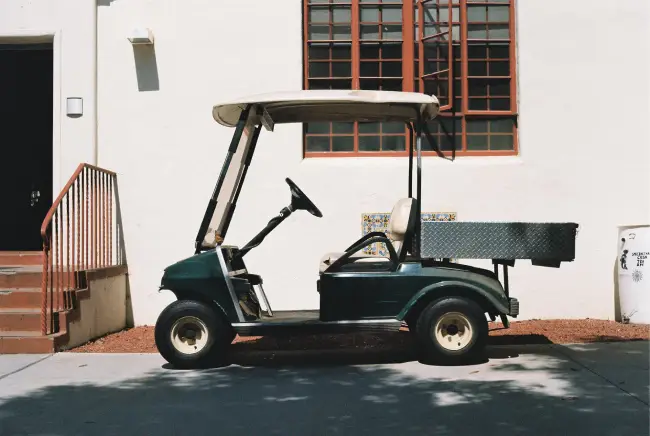Golf carts are great for getting around golf courses, but they’re also becoming popular for short trips in many towns. As they are used for more than just golf, questions about license standards come up more often. The details of whether you need a license to drive a golf cart are covered in this piece, which looks at different situations and rules.
Licensing Requirements for Golf Carts
In the United States, the rules for getting a license for a golf cart can be very different from one state to the next. This is because different areas have different safety standards and laws. For a general idea of what licenses golf carts need in different places, here are some examples from California, Florida, and Texas:
In general, golf carts don’t have to be registered or have a driver’s license in many states as long as they are only used on private land, like golf courses or gated communities. But golf carts may need to be licensed and registered if they are used on public roads or in places that aren’t private land.
Specific State Regulations
- California: In California, golf carts that meet specific safety requirements, such as headlights, tail lights, and turn signals, can be classified as Neighborhood Electric Vehicles (NEVs). NEVs must be registered with the Department of Motor Vehicles (DMV), and drivers typically need a valid driver’s license. They are allowed to operate on roads with speed limits up to 35 mph.
- Florida: Florida has different regulations for golf carts depending on their use. On golf courses and private property, no registration or driver’s license is required. However, if a golf cart is operated on public roads, it must be registered as a Low-Speed Vehicle (LSV) or NEV and the driver must have a valid driver’s license.
- Texas: In Texas, golf carts can be operated on public roads only within master-planned communities or golf cart-friendly areas. They must have headlights, tail lights, and a slow-moving vehicle emblem. While a driver’s license is not required, operators must be at least 14 years old.
It’s important to check with your local DMV or other officials to find out the regulations in your area, as they can be different from state to state and even from county to city. For safety and legal reasons, it’s important to know these rules when using golf carts, whether for fun or for something more useful.

How Old You Have to Be to Drive a Golf Cart?
Different places in the US have different rules about how old you have to be to drive a golf cart. Most of the time, these rules are in place to keep people safe and protect the golf carts. Here is a quick list of age limits and differences:
Minimum Age Requirements
While there is no federal minimum age requirement for operating golf carts, individual states establish their own regulations. In many states, the minimum age to operate a golf cart on public roads is typically 14 to 16 years old.
Different states have different rules
For example, in Florida, people as young as 14 can drive golf carts on public roads in certain neighborhoods as long as they are with a licensed adult. In some places, like California, drivers may need to be at least 16 years old.
- Required legal age to drive a golf cart for all 50 US states:
| State | Minimum Age to Operate | License or Permit Required |
| Alabama | 16 | Driver’s License |
| Alaska | 16 | Driver’s License |
| Arizona | 16 | Driver’s License |
| Arkansas | 14 | Driver’s License or Learner’s Permit |
| California | 18 | Driver’s License or Instruction Permit |
| Colorado | 14 | Driver’s License or Instruction Permit |
| Connecticut | 16 | Driver’s License or Learner’s Permit |
| Delaware | 16 | Driver’s License |
| Florida | 14 | No License Required |
| Georgia | 16 | Driver’s License or Instruction Permit |
| Hawaii | 16 | Driver’s License or Instruction Permit |
| Idaho | 14 | Driver’s License or Instruction Permit |
| Illinois | 16 | Driver’s License or Instruction Permit |
| Indiana | 16 | Driver’s License or Instruction Permit |
| Iowa | 14 | No License Required |
| Kansas | 14 | No License Required |
| Kentucky | 16 | Driver’s License or Instruction Permit |
| Louisiana | 15 | No License Required |
| Maine | 16 | Driver’s License or Instruction Permit |
| Maryland | 16 | Driver’s License |
| Massachusetts | 16 | Driver’s License or Instruction Permit |
| Michigan | 16 | Driver’s License or Instruction Permit |
| Minnesota | 15 | Driver’s License or Instruction Permit |
| Mississippi | 14 | No License Required |
| Missouri | 16 | Driver’s License or Instruction Permit |
| Montana | 14 | Driver’s License or Learner’s Permit |
| Nebraska | 14 | No License Required |
| Nevada | 16 | Driver’s License or Instruction Permit |
| New Hampshire | 14 | No License Required |
| New Jersey | 16 | Driver’s License or Instruction Permit |
| New Mexico | 15 | Driver’s License or Instruction Permit |
| New York | 16 | Driver’s License or Learner’s Permit |
| North Carolina | 16 | Driver’s License or Instruction Permit |
| North Dakota | 14 | No License Required |
| Ohio | 16 | Driver’s License or Instruction Permit |
| Oklahoma | 16 | Driver’s License or Instruction Permit |
| Oregon | 16 | Driver’s License or Instruction Permit |
| Pennsylvania | 16 | Driver’s License or Instruction Permit |
| Rhode Island | 16 | Driver’s License or Instruction Permit |
| South Carolina | 16 | Driver’s License or Instruction Permit |
| South Dakota | 14 | No License Required |
| Tennessee | 16 | Driver’s License or Instruction Permit |
| Texas | 16 | Driver’s License or Instruction Permit |
| Utah | 16 | Driver’s License or Instruction Permit |
| Vermont | 16 | Driver’s License or Instruction Permit |
| Virginia | 16 | Driver’s License or Learner’s Permit |
| Washington | 16 | Driver’s License or Instruction Permit |
| West Virginia | 16 | Driver’s License or Instruction Permit |
| Wisconsin | 16 | Driver’s License or Instruction Permit |
| Wyoming | 14 | Driver’s License or Instruction Permit |
Private Property Rules
- Age restrictions may differ for golf cart use on private property, such as golf courses or gated communities. In these cases, rules may be established by the property owners or homeowners’ associations.
Golf carts on public roads: the law and the limits
It depends on the state and local laws if golf carts can be driven on city streets. There isn’t a single rule that applies across the whole country. Here is a list of the laws and rules that apply to golf carts on city streets
A Look at State and Local Law
- Golf carts are often called “Low-Speed Vehicles” (LSVs) or “Neighborhood Electric Vehicles” (NEVs) in many states if they meet certain safety standards, like having headlights, taillights, turn signs, and seat belts.
- LSVs and NEVs are often allowed to operate on public roads with speed limits of 25 to 35 mph (40 to 56 km/h) or less, depending on state regulations.
- Local municipalities may have additional rules and restrictions regarding golf cart usage on city streets, so it’s essential to check both state and local laws.
Restrictions for Golf Carts on City Streets
- Speed Limits: Golf carts usually have speed limits that match the classification they fall under (LSV or NEV). They are not allowed on roads with higher speed limits unless specifically permitted.
- Registration and Insurance: Some states require golf carts operating on city streets to be registered and insured. This includes obtaining license plates and maintaining liability insurance.
- Driver’s License: Depending on the state, operators may need a valid driver’s license or a special golf cart license to drive on public roads.
- Safety Equipment: Golf carts must meet safety equipment requirements, such as lights, mirrors, and turn signals. Operators and passengers may be required to wear seat belts.
- Road Types: Golf carts may not be allowed on some roads, like highways and busy streets. They usually only work on streets and roads in their own towns.
- Age Restrictions: Some states have minimum ages for people who want to drive golf carts on public roads. Usually, these ages are between 14 and 16 years old.

Driver’s License Requirements for Golf Cart
Here is a general list of times you need a driver’s license and some alternatives or special situations.
Needs for a driver’s license
- To drive a golf cart on public roads in many places, you need a valid driver’s license.
- Some states may allow operators as young as 14 to 16 years old to drive golf carts on public roads if they possess a valid driver’s license or a special golf cart license.
Exceptions and Special Circumstances
- Private Property: You might not need a driver’s license on private property like golf courses, resorts, or gated communities, and the age limit might not be as tight. Rules may be different, though, based on who manages the property or the homeowners’ association.
- Low-Speed Vehicles (LSVs) and Neighborhood Electric Vehicles (NEVs): In states where golf carts can be classified as LSVs or NEVs, a regular driver’s license is typically required, similar to operating a small car.
- Special Licenses: Some states may offer a special golf cart or low-speed vehicle license that allows individuals to operate golf carts on public roads without a full driver’s license.
It’s essential to check the specific regulations in your state or locality to determine whether a driver’s license is required for operating a golf cart on public roads. To stay on the right side of the law and drive a golf cart safely, you need to know these rules and circumstances.

Safety Guidelines for Golf Cart Operators
When driving a golf cart, safety is the most important thing, whether you’re on the course, in a neighborhood, or on the road. Stressing safety not only lowers the chance of crashes, but it also makes the experience better overall. Here are some essential safety guidelines and best practices:
Why safety is important
- Protecting Lives: Safety measures ensure the well-being of operators, passengers, and pedestrians.
- Legal Compliance: Following safety rules and regulations can help you stay out of trouble with the law and avoid fines.
- Maintenance: Following safety rules can make the golf cart last longer by avoiding damage.
- Reputation: Safety-conscious operators enhance the reputation of golf cart use, whether for recreation or practical purposes.
Safety Tips and the Best Ways to Do Things
- Seat Belts: Both the driver and the passengers should always wear seat belts when they are present.
- Speed Control: Follow the speed limits that are listed and drive at a speed that is safe for the road conditions.
- No Overcrowding: Follow manufacturer’s capacity guidelines, avoid overcrowding, and do not exceed passenger limits.
- Lights and Signals: Use headlights, brake lights, and turn signals as required by law.
- Avoid Distractions: Pay attention to driving and don’t do anything else, like texting or talking on the phone.
- Yield to Traffic: On public roads, you should yield to bigger cars and follow the rules of the road.
- Braking: Apply brakes gradually to avoid sudden stops or skidding.
- Maintenance: Regularly inspect and maintain the golf cart, including brakes, tires, and lights.
- Parking: Engage the parking brake when parked, especially on inclines.
- Weather Conditions: Be careful when the weather is bad, like when it’s raining or foggy, because golf carts don’t have much grip.
Penalties for Violating Golf Cart Regulations
Violating local golf cart regulations can result in various consequences, including fines, legal issues, and safety risks. The penalties for non-compliance may vary depending on the severity of the violation and local laws. Here are potential consequences of not adhering to golf cart regulations:
- Fines: People who break the law may be given fines by the police or the local government. Based on the exact violation, the fine can be very different amounts.
- Legal Troubles: Serious violations could lead to legal consequences, including citations, court appearances, and possible criminal charges.
- Revocation of Privileges: If you break the rules too many times or in a serious way, you could lose the right to drive a golf cart, either temporarily or forever.
- Safety Risks: Not following safety rules can cause crashes, injuries, or damage to property, which puts the operator and other people around them at risk.
It is crucial to be aware of and comply with local golf cart regulations to avoid these potential penalties.
FAQs
Q: Do I need a driver’s license to operate a golf cart?
A: It depends on your state and local regulations. In many cases, a driver’s license is required for operating golf carts on public roads.
Q: Can I use a golf cart on public roads in my area?
A: Check the rules and laws in your area. Some places let you use golf carts on public roads, while other places might have rules or even bans against it.
Q: What safety equipment should I have on my golf cart?
A: Depending on the rules in your area, safety equipment may include headlights, taillights, turn signals, and seat belts.
Q: Are there age restrictions for golf cart operators?
A: Age requirements vary by state. In some places, operators must be at least 14 to 16 years old.
Q: Do I need insurance for my golf cart?
A: If you use your golf cart on public roads, you might want to get insurance to protect yourself from risk and theft or damage. Find out more from your insurance company.








